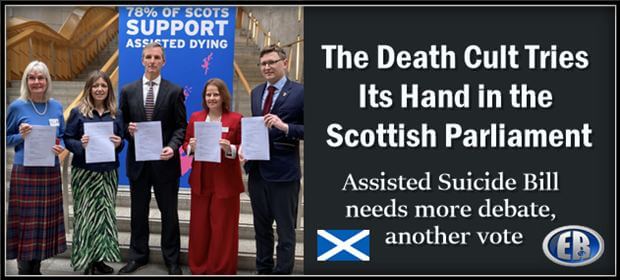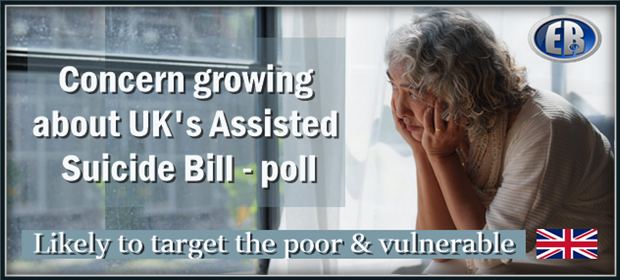
ER Editor: We had reported on Labour MP Kim Leadbeater’s UK assisted suicide bill here. From May 6 —
Public opposition to UK euthanasia bill is growing

It seems this is getting opposition from psychiatrists according to the Daily Sceptic via The Telegraph —
Has the Royal College of Psychiatrists Killed the Assisted Suicide Bill?
The UK bill had received initial support, gaining much publicity, only to peter out. Scotland is now going through a rinse-and-repeat, it would seem.
From the BBC two days ago —
How your MSP voted on the assisted dying bill
We smell a playbook to wake up a sleeping public to the death cult they’ve been living under. Those especially who have willingly succumbed like lemmings to the Covid Death Shots.
The common theme in these stories is that disability rights groups are not being listened to.
********
Scotland’s assisted suicide bill passes first vote in parliament after intense debate
The Assisted Dying for Terminally Ill Adults Bill, by a 70 to 56 vote, has been affirmed ‘in principle’ and will face two more parliamentary hurdles before becoming law.
JONATHON VAN MAREN for LIFESITE NEWS
A bill to legalize assisted suicide in Scotland has cleared the first hurdle in an initial vote at Holyrood, the country’s parliament. The Assisted Dying for Terminally Ill Adults (Scotland) Bill, which passed by a margin of 70 votes to 56, has been affirmed “in principle,” and will face two more parliamentary hurdles before becoming law.
 Scottish ParliamentFotokon / Shutterstock.com
Scottish ParliamentFotokon / Shutterstock.comThe parliamentary debate was intense and emotional. Using the now-familiar rhetoric, advocates of assisted suicide insisted that legalization is necessary to end the suffering of the dying, with one MSP citing her mother’s death from cancer as her motive for voting in favor. Ally Thomson, the director of Dignity in Dying Scotland, claimed the vote in favor of doctor-administered lethal injections was “a watershed for compassion.”
Sadly, those with disabilities once again found their voices ignored by the majority. In Canada, disability rights groups have been utterly unheeded by the government, even after the UN Committee on the Rights of Persons with Disabilities condemned the regime. Every disability rights group in the UK has condemned Leadbeater’s assisted suicide bill; MPs rejected virtually all safeguards for those with disabilities.
A similar scene unfolded in Scotland. Labour MSP Pam Ducan-Glancy, the first permanent wheelchair user to be elected to Holyrood, told BBC Scotland News that she was “deeply worried” that the bill would put disabled people at risk,” and that this was the first step to making it “easier to help to die than help to live.” The bill, she said, could “legitimize a view that a life like ours, one of dependence and often pain, is not worth living.” The vote, in short, left her “heartbroken.” Her fears did not dent the celebration of assisted suicide supporters.
Indeed, Liberal Democrat MSP Liam McArthur, who brought the bill forward, told BBC Scotland News that he was “delighted” and “relived,” calling it “a brave step” but “a compassionate one.” Two previous votes to legalize assisted suicide had failed on the first vote, but this time, McArthur said, “it is a step I believe Scotland is ready to take.” He was supported by Conservative leader Russell Findlay, Lib Dem leader Alex Cole-Hamilton, and the co-leaders of the Scottish Green Party, Patrick Harvie and Lorna Slater.
READ: You must oppose assisted suicide even if you’re not Christian: here’s why
McArthur went further, directly contradicting the nearly unanimous fears of disability rights groups. “Denying dying Scots more choice will not enhance the lives of those with a disability,” he said. “Nor do I believe would it be acceptable for a person with a disability who meets the eligibility criteria under my bill to be denied the same choice as anyone else.” The fact that they believe, apparently, does not give him pause.
While First Minister John Swinney, who came out against the bill in a series of powerful statements earlier this month, voted against it, the Scottish government unfortunately chose to stay neutral, and Health Secretary Neil Gray abstained from the vote. First Minister Kate Forbes and Labour leader Anas Sarwar both condemned the bill; Swinney and Forbes are both committed Christians. Swinney stated that he hoped “significant issues” with the bill could be dealt with, and former first minister Nicola Sturgeon, a staunch progressive, opposed the bill due to the potential for “coercion.” (ER: We believe she may be a 2.0 by now.)
In fact, the “slippery slope” warned of by many Scottish critics, including ex-Tory leader Douglas Ross, is an inevitability. McArthur noted that other countries had legalized assisted suicide despite these fears; those countries, particularly Canada, should enhance rather than allay those concerns. Indeed, McArthur’s bill limits (for the moment) assisted suicide to the terminally ill but does not specify a life expectancy timeline. In Canada, the first safeguard to be removed was the “expectation of reasonably foreseeable death.”
McArthur’s bill will now be scrutinized at a second stage, and changes proposed and debated, with another vote on a final draft of the bill being held before it becomes law. The BBC noted that Dr. Gordon Macdonald, the chief executive of Care Not Killing, stated that there is still “massive opposition” to the bill and that the fight is not over yet. Stuard Weir of CARE for Scotland stated that “Our thoughts are with disabled Scots and many others who will be feeling great anxiety.”
The vote in Scotland this week is a tragedy, but as with Kim Leadbeater’s Westminster euthanasia bill, it is possible that the legislation will lose support as the social costs become clearer during further debate. The BBC noted: “It is worth noting that a number of those who backed the bill still have deep reservations and want to see that their concerns can be addressed in the next stage of debate.”
Once again, a Western country is having the debate: Should the government prioritize the “choice” or the lives of the vulnerable?
Source
Featured image source: https://www.humanism.scot/2024/03/28/assisted-dying-bill-for-scotland-published-marking-the-start-of-its-passage-through-holyrood/
************
Published to The Liberty Beacon from EuropeReloaded.com

![]()
••••
The Liberty Beacon Project is now expanding at a near exponential rate, and for this we are grateful and excited! But we must also be practical. For 7 years we have not asked for any donations, and have built this project with our own funds as we grew. We are now experiencing ever increasing growing pains due to the large number of websites and projects we represent. So we have just installed donation buttons on our websites and ask that you consider this when you visit them. Nothing is too small. We thank you for all your support and your considerations … (TLB)
••••
Comment Policy: As a privately owned web site, we reserve the right to remove comments that contain spam, advertising, vulgarity, threats of violence, racism, or personal/abusive attacks on other users. This also applies to trolling, the use of more than one alias, or just intentional mischief. Enforcement of this policy is at the discretion of this websites administrators. Repeat offenders may be blocked or permanently banned without prior warning.
••••
Disclaimer: TLB websites contain copyrighted material the use of which has not always been specifically authorized by the copyright owner. We are making such material available to our readers under the provisions of “fair use” in an effort to advance a better understanding of political, health, economic and social issues. The material on this site is distributed without profit to those who have expressed a prior interest in receiving it for research and educational purposes. If you wish to use copyrighted material for purposes other than “fair use” you must request permission from the copyright owner.
••••
Disclaimer: The information and opinions shared are for informational purposes only including, but not limited to, text, graphics, images and other material are not intended as medical advice or instruction. Nothing mentioned is intended to be a substitute for professional medical advice, diagnosis or treatment.

Leave a Reply